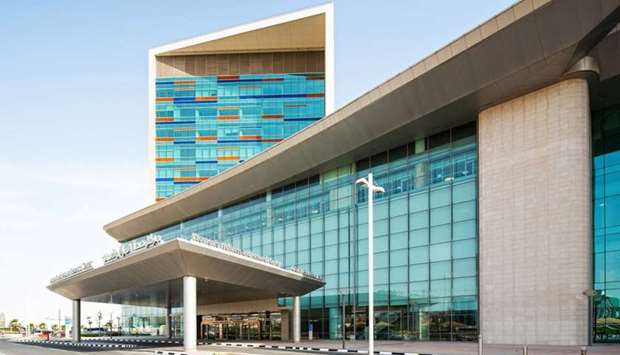Women’s Wellness and Research Center (WWRC) will hold virtual training for breastfeeding and telephone consultations for pregnant women and breastfeeding mothers from for three days from Tuesday to observe World Breastfeeding Week (WBW) 2020 and in compliance with infection control measures against the spread of Covid-19.
WWRC, which is a centre for promoting breastfeeding and an internationally accredited Baby Friendly Hospital, is keen to raise awareness of breastfeeding and promote its importance for babies and mothers through initiatives such as WBW and other awareness campaigns.
The activities are being organised by the WWRC’s Baby Friendly Hospital Initiative (BFHI) team lead Dr Amal Abu Bakr Arbab, supported by Dr Mai al-Qubaisi, senior consultant, director of NICU and chairperson of BFHI programme.
Over the three-day event, the team including lactation consultants, breastfeeding resource nurses as well as patient family educators will be available to virtually attend to queries relating to breastfeeding from pregnant women and mothers. They will also teach in-patient mothers the skill that will support them to exclusively breastfeed for six months.
As the global community observes the yearly World Breastfeeding Week 2020 under the theme, “Support Breastfeeding for a Healthier Planet”, Dr Arbab says the objective of this year’s WBW is not only to inform people about the links between breastfeeding and the environment, but also to galvanise action on improving the health of the planet and people through breastfeeding.
“Breastfeeding is the best way of providing newborns and young infants with the nutrients, antibodies, enzymes, and substances they need for healthy growth and development. Breastmilk is a natural renewable food that is environmentally safe and friendly,” Dr Arbab stated. She stressed that breastmilk is portable and readily available to infants and all mothers can breastfeed at any time and according to the needs and demands of their babies.
Highlighting the importance of WBW, Dr al-Qubaisi reinforces the recommendations of the World Health Organisation and United Nations International Children’s Emergency Fund that babies should be fed only their mothers’ milk right from birth up to their first six months of life and to continue to breastfeed for two years and beyond in addition to consuming nutritionally adequate and safe complimentary (solid) foods.
“Breastfeeding is the best start for both mother and baby. It provides joyful moments of interaction and bonding between mother and baby that enriches their life together. Breastmilk is the natural first food for babies. It is all the food and drink that a baby needs in an adequate quantity and quality for the first six months of life,” Dr al-Qubaisi said.
Dr al-Qubaisi explained, that breastfeeding has several health, economic and social benefits for babies, mothers, families and the communities. “Breastfeeding benefits the environment as it is eco-friendly and it saves babies and mothers’ lives as it includes antibodies, enzymes, hormones and substances for healthy growth and development. Scientific evidence proved that globally, exclusive breastfeeding for six months could prevent 1.3mn infant deaths and optimal breastfeeding can reduce more than 800,000 child deaths as well as 20,000 maternal deaths each year,” she added.
The activities are being organised by the WWRC’s Baby Friendly Hospital Initiative (BFHI) team lead Dr Amal Abu Bakr Arbab, supported by Dr Mai al-Qubaisi, senior consultant, director of NICU and chairperson of BFHI programme.
Over the three-day event, the team including lactation consultants, breastfeeding resource nurses as well as patient family educators will be available to virtually attend to queries relating to breastfeeding from pregnant women and mothers. They will also teach in-patient mothers the skill that will support them to exclusively breastfeed for six months.
As the global community observes the yearly World Breastfeeding Week 2020 under the theme, “Support Breastfeeding for a Healthier Planet”, Dr Arbab says the objective of this year’s WBW is not only to inform people about the links between breastfeeding and the environment, but also to galvanise action on improving the health of the planet and people through breastfeeding.
“Breastfeeding is the best way of providing newborns and young infants with the nutrients, antibodies, enzymes, and substances they need for healthy growth and development. Breastmilk is a natural renewable food that is environmentally safe and friendly,” Dr Arbab stated. She stressed that breastmilk is portable and readily available to infants and all mothers can breastfeed at any time and according to the needs and demands of their babies.
Highlighting the importance of WBW, Dr al-Qubaisi reinforces the recommendations of the World Health Organisation and United Nations International Children’s Emergency Fund that babies should be fed only their mothers’ milk right from birth up to their first six months of life and to continue to breastfeed for two years and beyond in addition to consuming nutritionally adequate and safe complimentary (solid) foods.
“Breastfeeding is the best start for both mother and baby. It provides joyful moments of interaction and bonding between mother and baby that enriches their life together. Breastmilk is the natural first food for babies. It is all the food and drink that a baby needs in an adequate quantity and quality for the first six months of life,” Dr al-Qubaisi said.
Dr al-Qubaisi explained, that breastfeeding has several health, economic and social benefits for babies, mothers, families and the communities. “Breastfeeding benefits the environment as it is eco-friendly and it saves babies and mothers’ lives as it includes antibodies, enzymes, hormones and substances for healthy growth and development. Scientific evidence proved that globally, exclusive breastfeeding for six months could prevent 1.3mn infant deaths and optimal breastfeeding can reduce more than 800,000 child deaths as well as 20,000 maternal deaths each year,” she added.

